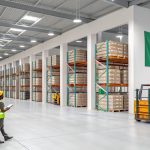At Novatia Consulting, we understand the urgent need for Green Logistics Consulting in Nigeria. Our customized approach seamlessly integrates sustainable practices into supply chains, enabling businesses to minimize waste, enhance transportation efficiency, and achieve significant cost savings while reducing their environmental impact. We tackle the unique challenges presented by Nigeria's infrastructure and regulatory environment, guiding companies to optimize operational efficiency and align with consumer expectations for sustainability. By emphasizing eco-friendly packaging solutions and renewable energy sources, we empower organizations to lower their carbon footprints and enhance their brand reputation. Explore how our Green Logistics Consulting strategies can revolutionize your logistics operations for a sustainable future.
Key Takeaways
– Green Logistics Consulting in Nigeria: Integrating Sustainable Practices for Enhanced Operational Efficiency
Novatia Consulting specializes in integrating sustainable practices into logistics frameworks in Nigeria, addressing local challenges and enhancing operational efficiency.
– Optimizing Transportation Routes: A Green Logistics Consulting Approach for Nigerian Businesses
The consulting service focuses on optimizing transportation routes and reducing carbon footprints through tailored strategies for Nigerian businesses.
– Eco-Friendly Packaging Solutions: A Key Element of Green Logistics Consulting in Nigeria
Novatia promotes eco-friendly packaging solutions and advocates for carbon offsetting initiatives to mitigate environmental impact in the logistics sector.
– Building Resilient Supply Chains: The Role of Green Logistics Consulting in Nigeria
The firm emphasizes collaboration with stakeholders to build resilient supply chains that meet regulatory requirements and consumer sustainability expectations.
– Lowering Operational Costs: How Green Logistics Consulting is Transforming Nigeria's Logistics Sector
By adopting renewable energy sources, Novatia helps logistics companies lower operational costs and improve brand reputation in Nigeria's competitive market.
Importance of Green Logistics
When we take a closer look at the role of green logistics, its importance cannot be overstated. As we navigate the complexities of today's supply chains, adopting environmentally friendly practices is not just beneficial—it is essential. Green logistics addresses the pressing need to reduce our environmental impact while ensuring efficient product delivery. By optimizing transportation routes, reducing energy consumption, and minimizing waste, we can significantly lower the carbon footprint associated with logistics operations.
Moreover, green logistics enhances supply chain transparency. In a world increasingly focused on sustainability, consumers demand to know where their products come from and how they are produced. By implementing green logistics strategies, we not only boost our operational efficiency but also provide our customers with the transparency they seek. This transparency fosters trust and loyalty, which are invaluable in a competitive market.
Additionally, embracing green logistics can lead to substantial cost savings. While there may be initial investments in sustainable technologies, the long-term savings from reduced fuel costs and waste management can be significant. Furthermore, we position ourselves as leaders in corporate social responsibility, attracting customers who prioritize sustainability in their purchasing decisions.
Overview of Green Logistics Consulting
Title: Transforming Supply Chains: The Role of Green Logistics Consulting in Sustainable Practices
Green logistics consulting offers a strategic approach to integrating sustainability into the supply chain. By focusing on practices that minimize environmental impact, we aim to guide businesses toward a more responsible and efficient logistics framework. In our experience, companies often overlook the vast potential that sustainable logistics holds, especially when it comes to implementing sustainable packaging solutions and achieving carbon neutrality.
As we explore the domain of green logistics, we recognize that the modern consumer increasingly values sustainability. This shift presents both a challenge and an opportunity for businesses. By embracing green logistics consulting, companies can not only improve their brand reputation but also boost operational efficiency. Implementing sustainable packaging reduces waste and promotes the use of eco-friendly materials, which is not only beneficial for the environment but can also lead to cost savings in the long run.
Moreover, we emphasize the importance of carbon neutrality in logistics operations. Achieving this goal involves evaluating carbon footprints, optimizing transportation routes, and utilizing alternative energy sources. Our consulting services focus on developing tailored strategies that facilitate this change, ensuring that our clients can meet regulatory requirements and consumer expectations alike.
Benefits of Sustainable Practices
The Numerous Benefits of Sustainable Practices in Logistics
Sustainable practices in logistics offer numerous benefits that extend beyond environmental responsibility. By adopting these practices, we can boost our operational efficiency and improve our overall competitiveness in the market. One of the most significant advantages is sustainable sourcing. By choosing suppliers who prioritize eco-friendly materials and processes, we not only reduce our carbon footprint but also foster a more resilient supply chain. This approach often leads to cost savings in the long run, as we can minimize waste and optimize resource use.
Additionally, focusing on energy efficiency can yield substantial financial benefits. Implementing energy-efficient technologies and processes can drastically lower our energy consumption, resulting in reduced operational costs. For example, utilizing energy-efficient transportation methods or optimizing delivery routes minimizes fuel use, which directly contributes to lower expenses. Furthermore, these practices can also lead to improved customer satisfaction, as consumers increasingly prefer businesses that demonstrate a commitment to sustainability.
Moreover, embracing sustainable logistics practices can enhance our brand reputation. As we synchronize our operations with global sustainability trends, we not only attract environmentally conscious consumers but also position ourselves favorably with stakeholders and investors who value corporate responsibility.
Key Challenges in Nigeria
Navigating the Logistics Landscape in Nigeria: Addressing Key Challenges for Sustainable Practices
Steering through the logistics landscape in Nigeria presents us with a distinct set of challenges that can obstruct the adoption of sustainable practices. One of the most pressing issues is the infrastructure challenges we face. Poor road conditions, inadequate transport facilities, and limited access to modern logistics networks significantly affect our ability to implement green logistics solutions effectively.
Moreover, policy barriers often complicate matters. Regulatory frameworks are either outdated or poorly enforced, creating a sense of uncertainty for businesses looking to invest in sustainable practices. Economic constraints further exacerbate this situation; many companies struggle to allocate sufficient resources for green initiatives due to tight budgets and competing priorities.
Technology adoption is another critical hurdle. While innovative logistics technologies can enhance efficiency and reduce waste, many organizations lack the necessary expertise and investment to integrate these solutions into their operations. This gap is compounded by low public awareness of the importance of sustainable logistics, which limits demand for greener options.
We must also highlight the necessity of robust stakeholder involvement. Collaboration among government entities, businesses, and communities is essential for establishing a unified approach to overcoming these challenges. Finally, improving resource allocation will be crucial in effectively addressing these issues. By prioritizing investments in infrastructure, technology, and education, we can pave the way for more sustainable logistics practices in Nigeria. Only through a collective effort can we hope to navigate these challenges and achieve a greener future for our logistics sector.
Novatia Consulting's Approach
At Novatia Consulting, we recognize that addressing logistics challenges in Nigeria demands a comprehensive strategy tailored to the region's unique landscape. Our approach emphasizes the integration of sustainable practices into the supply chain to enhance efficiency while minimizing environmental impact. We firmly believe that by adopting innovative solutions, we can significantly improve the sustainability of the logistics sector.
A vital component of our strategy is the promotion of sustainable packaging. We understand that packaging is a crucial element of logistics, and utilizing eco-friendly materials can substantially reduce waste and carbon footprints. By partnering with our clients, we identify and implement sustainable packaging solutions that not only comply with regulatory standards but also appeal to environmentally-conscious consumers.
Additionally, we advocate for carbon offsetting initiatives as a means of mitigating emissions generated during logistics operations. By endorsing projects that capture or prevent greenhouse gas emissions, we assist our clients in achieving their sustainability objectives. We provide guidance in selecting credible carbon offset programs that align with their values and operational practices.
Reducing Carbon Footprint
Title: Strategies for Reducing Carbon Footprint in Logistics
Reducing the carbon footprint in logistics is increasingly becoming a critical focus for businesses aiming for sustainability. As we navigate the complexities of modern supply chains, it is essential to adopt effective strategies that not only minimize our environmental impact but also improve our competitive edge.
One of the most impactful approaches to reducing carbon footprint is the implementation of carbon offsetting strategies. By investing in renewable energy projects or reforestation initiatives, we can compensate for the emissions produced during transportation. This not only helps us achieve carbon neutrality but also demonstrates our commitment to environmental stewardship, which can significantly enhance our brand image.
Moreover, embracing sustainable sourcing practices is equally important in our efforts to reduce carbon footprint. By prioritizing suppliers who share our values on sustainability, we can ensure that our entire supply chain aligns with our carbon reduction goals. This involves selecting materials and products that are environmentally friendly, reducing waste, and optimizing transportation routes to lower emissions.
It's important to remember that our efforts in reducing carbon footprint can lead to tangible benefits—cost savings, improved efficiency, and increased customer loyalty. As we engage in these practices, we also contribute to a broader movement toward a sustainable future.
Supply Chain Optimization
As we strive to minimize our carbon footprint, it is evident that supply chain optimization plays a pivotal role in this mission. By emphasizing supply chain resilience and sustainable sourcing, we can establish systems that not only address current demands but also preserve resources for the future.
Supply chain optimization extends beyond cost reduction; it is about enhancing efficiency while maintaining environmental responsibility. We can accomplish this by assessing our sourcing strategies, ensuring that we prioritize suppliers committed to sustainable practices. This approach not only mitigates environmental impact but also advocates for ethical business conduct.
Furthermore, resilient supply chains are vital in today's unpredictable market landscape. They enable us to swiftly adapt to disruptions, whether arising from natural disasters or logistical hurdles. By investing in technology and data analytics, we can derive valuable insights into our supply chain processes, allowing us to pinpoint bottlenecks and streamline operations. This leads to reduced waste and lower emissions, which are crucial as we pursue a greener future.
Incorporating sustainable sourcing into our supply chains also nurtures long-term partnerships with suppliers dedicated to eco-friendly practices. Such collaboration can yield innovative solutions that benefit all stakeholders, reinforcing our commitment to sustainability.
Eco-Friendly Transportation Solutions
Eco-Friendly Transportation Solutions: A Pathway to Sustainable Logistics
Innovative eco-friendly transportation solutions are crucial for advancing our sustainability goals in logistics. As we traverse the complexities of the supply chain, we must prioritize methods that minimize our carbon footprint. By adopting greener transportation options, we not only improve efficiency but also synchronize our operations with the increasing demand for environmental accountability.
One of the most effective ways to achieve this is through sustainable sourcing. By selecting suppliers that prioritize eco-friendly practices, we ensure that our logistics processes start from the ground up. For instance, using renewable fuels, such as biodiesel, can greatly reduce emissions associated with freight transportation. Additionally, we can explore the integration of electric vehicles into our fleet, which offers a cleaner alternative to traditional fuel-powered transport.
Furthermore, we should consider how eco-friendly packaging complements these transportation solutions. Lightweight, biodegradable, or recyclable packaging materials can decrease the overall weight of shipments, leading to reduced fuel consumption. When we optimize our packaging and transportation methods concurrently, we create a holistic approach to sustainability that resonates with consumers and stakeholders alike.
Waste Management Strategies
Maximizing Sustainability Through Effective Waste Management Strategies in Logistics
Effective waste management strategies are crucial for achieving sustainability within our logistics framework. As we navigate the complexities of logistics in Nigeria, it is essential to adopt comprehensive waste management approaches that focus on waste reduction and recycling initiatives. By prioritizing these areas, we can significantly minimize the environmental impact of our operations.
First and foremost, we should emphasize waste reduction at every stage of our logistics processes. This involves a thorough analysis of our supply chains to identify opportunities for eliminating unnecessary packaging and streamlining operations. By reducing the volume of waste generated, we not only lower disposal costs but also enhance our overall operational efficiency.
Implementing recycling initiatives is equally critical to ensure that the materials we utilize are repurposed effectively. Forming partnerships with recycling facilities can facilitate the creation of a circular economy, where materials are reused instead of discarded. This approach not only conserves valuable resources but also contributes to reducing our carbon footprint. Additionally, we can motivate our customers and suppliers to engage in these initiatives, amplifying our sustainability impact.
Furthermore, it is vital to regularly monitor and assess our waste management strategies. Tracking our progress allows us to make informed decisions and continuously refine our practices. Additionally, engaging our employees through training programs focused on waste management can cultivate a culture of sustainability within our organization, reinforcing our commitment to effective waste management strategies.
Renewable Energy Integration
Harnessing Renewable Energy for Sustainable Logistics in Nigeria
Harnessing the potential of renewable energy is essential for transforming our logistics operations in Nigeria toward greater sustainability. By integrating renewable energy sources, we can considerably reduce our carbon footprint and improve operational efficiency. This transformation isn't just about compliance with regulations; it's about embracing a future where renewable energy technology is at the forefront of our logistics strategies.
Incorporating renewable energy sources such as solar, wind, and bioenergy into our logistics framework allows us to tap into abundant resources while minimizing reliance on fossil fuels. For instance, solar panels on warehouse roofs or electric vehicles powered by wind energy can drastically lower energy costs and elevate our brand's reputation as an eco-conscious entity. The initial investment in renewable energy technology may seem overwhelming, but the long-term savings and environmental benefits make it a wise choice.
Moreover, integrating renewable energy fosters innovation within our logistics processes. It encourages us to rethink how we manage our supply chains, pushing us toward more efficient practices and smarter resource allocation. By leveraging renewable energy, we can create a resilient logistics network that not only meets current demands but is also adaptable to future challenges.
Case Studies in Nigeria
As we delve into the integration of renewable energy in logistics within Nigeria, it is essential to examine real-world applications that illustrate this transition. One compelling case study showcases a local logistics company that embraced sustainable sourcing practices by collaborating with eco-conscious suppliers. By procuring materials from nearby producers, they successfully reduced transportation emissions while simultaneously supporting the local economy. This strategic approach not only lowered operational costs but also highlighted their commitment to sustainability, providing a competitive advantage in a market that increasingly values green initiatives.
Another notable example features a manufacturing firm that transitioned to eco-friendly packaging solutions. By replacing traditional plastic materials with biodegradable alternatives, they significantly diminished their environmental footprint. This shift not only resonated with environmentally conscious consumers but also ensured compliance with emerging regulations regarding packaging waste. The change enhanced their brand image while aligning with global sustainability trends.
Moreover, the incorporation of renewable energy sources into logistics operations has proven to enhance efficiency. Companies that have integrated solar power into their logistics processes have reported considerable savings on energy expenses. These savings can be redirected towards further green initiatives, such as expanding their fleet of electric vehicles, thereby further reducing emissions.
In our analysis, these case studies demonstrate that adopting sustainable sourcing and eco-friendly packaging is not merely a passing trend; it is a strategic imperative that can yield long-term profitability and foster brand loyalty. By drawing insights from these examples, we can inspire more Nigerian businesses to embrace similar sustainable practices and contribute to a greener future.
Measuring Sustainability Impact
Measuring Sustainability Impact: A Key to Effective Logistics in Nigeria
As companies in Nigeria make significant strides toward sustainable logistics, measuring the sustainability impact of these initiatives becomes essential for understanding their effectiveness and guiding future efforts. To accomplish this effectively, we need to adopt robust sustainability metrics that enable us to assess our achievements and identify areas for improvement.
Firstly, it's crucial to define clear objectives that align with our sustainability goals. This process may involve tracking key performance indicators (KPIs) such as carbon emissions reduction, energy efficiency improvements, and resource consumption. By implementing these sustainability metrics, we can establish a baseline for our impact assessment and monitor our progress over time.
Secondly, conducting regular impact assessments is vital to analyze our logistics operations. This entails examining data collected from our sustainability metrics and comparing it against our objectives. By identifying trends, successes, and setbacks, we can refine our strategies and enhance our overall performance.
Additionally, sharing our findings with stakeholders—including employees, customers, and partners—promotes a culture of accountability and transparency. By showcasing our commitment to sustainability through measurable results, we can build trust and foster collaboration towards achieving common sustainability goals.
Regulatory Compliance in Logistics
Navigating the Complex Landscape of Regulatory Compliance in Logistics in Nigeria
Steering through the intricate terrain of regulatory compliance in logistics is essential for our operations in Nigeria. As we navigate these waters, understanding the various regulatory frameworks and compliance standards is vital. The logistics sector is governed by numerous environmental regulations and logistics policies aimed at minimizing ecological impact while ensuring operational efficiency.
To meet the legal requirements set forth by the government, we must adhere to industry guidelines that dictate best practices. These guidelines not only help us maintain compliance but also enhance our reputation in the market. A key component of our strategy involves engaging in thorough certification processes, ensuring that our operations align with recognized standards. This approach fosters trust among our clients and opens doors for new opportunities.
Moreover, we need to implement robust auditing practices to regularly assess our compliance status. This proactive stance allows us to identify potential gaps in our processes and rectify them promptly. By doing so, we not only comply with regulations but also position ourselves as leaders in sustainable logistics.
Future of Green Logistics
The Promising Future of Green Logistics in Nigeria: A Sustainable Shift
The future of green logistics in Nigeria holds immense promise, driven by an increasing awareness of environmental sustainability and the need for efficient resource management. As we traverse this pivotal moment, we must recognize that the adoption of sustainable technologies will be essential in transforming our logistics sector. With innovations such as electric vehicles, smart routing software, and energy-efficient warehouses, we can markedly reduce our carbon footprint while improving operational efficiency.
Furthermore, embracing a circular economy will play a significant role in shaping the landscape of green logistics. By rethinking supply chains and focusing on waste reduction, we can promote the reuse and recycling of materials, ultimately creating a more sustainable model that benefits both businesses and the environment. Implementing these practices not only corresponds with global sustainability goals but also positions us competitively in an increasingly eco-conscious marketplace.
We must also consider the collaboration among stakeholders in green logistics, including government agencies, private sector players, and non-governmental organizations. By fostering partnerships and sharing best practices, we can accelerate the shift to greener logistics solutions. As we involve ourselves in this journey, let's remember that the benefits extend beyond compliance; they include cost savings, improved brand reputation, and increased customer loyalty.
How to Get Started
Getting Started with Green Logistics in Nigeria: A Path to Sustainability
As we embrace the promising future of green logistics in Nigeria, taking actionable steps to implement sustainable practices becomes increasingly vital. The journey toward greener supply chains requires a collective commitment to energy efficiency and innovative strategies. So, how do we get started?
First, we should conduct a thorough assessment of our current logistics operations. This involves evaluating our supply chain processes to identify areas where energy consumption can be reduced. By pinpointing inefficiencies, we can develop tailored strategies that correspond with our sustainability goals.
Next, we need to invest in technology that improves energy efficiency in our logistics operations. This could include implementing route optimization software, which minimizes fuel consumption by guaranteeing the most efficient delivery paths are taken. Additionally, exploring alternative fuels and electric vehicles can greatly reduce our carbon footprint.
Collaboration is key in our green logistics journey. We must involve ourselves with suppliers and partners who share our vision of a sustainable supply chain. By fostering relationships built on sustainability principles, we can collectively work towards reducing our environmental impact.
Training and educating our workforce is equally essential in the realm of green logistics. By instilling a culture of sustainability within our teams, we enable everyone to take ownership of their role in promoting green logistics.
Lastly, let's continuously monitor our progress in implementing green logistics practices. Setting measurable goals and regularly reviewing our performance guarantees that we remain on track and make adjustments as necessary.
Frequently Asked Questions
What Qualifications Should I Look for in a Green Logistics Consultant?
When searching for a green logistics consultant, it is crucial to prioritize qualifications that demonstrate expertise in sustainability strategies and a comprehensive understanding of environmental impact. Candidates should possess relevant experience in implementing eco-friendly practices and a proven track record in reducing carbon footprints. Certifications in environmental management can also add significant value to their profile. It is important to ensure that the consultant is not only knowledgeable but also genuinely passionate about making a difference in the logistics sector.
How Long Does a Green Logistics Consulting Project Typically Take?
When considering the duration of a green logistics consulting project, it is important to note that project timelines can vary significantly. Typically, we can anticipate that the process may take anywhere from several weeks to a few months, depending on the specific consulting phases involved. The initial assessments and data collection stages usually require a few weeks, while the implementation and evaluation phases may extend the overall timeline considerably. Therefore, it is crucial to plan accordingly to ensure a comprehensive and effective transformation in logistics practices.
What Industries Can Benefit From Green Logistics Consulting?
Many industries can significantly benefit from green logistics consulting, particularly those that prioritize sustainable supply chains and eco-friendly transportation solutions. Sectors such as retail, manufacturing, and food services stand to gain by markedly reducing their environmental impact. Through the optimization of logistics processes, these industries can enhance efficiency, decrease costs, and foster sustainability. By embracing green logistics practices, companies not only contribute positively to the environment but also bolster their brand reputation and cultivate customer loyalty. Isn't it time for all industries to transition towards greener solutions?
Are There Any Certifications for Green Logistics Practices?
Absolutely, there are various certifications available for green logistics practices that can significantly enhance our sustainability efforts. These certifications typically emphasize sustainable transportation methods and eco-friendly packaging solutions. By obtaining such certifications, we not only showcase our commitment to environmental stewardship but also gain a competitive advantage in the market. Embracing these green logistics practices can lead to reduced costs and increased customer satisfaction, making it a strategic decision for our organization.
How Much Does Green Logistics Consulting Cost in Nigeria?
When evaluating the cost of green logistics consulting in Nigeria, it is essential to perform a comprehensive cost analysis. The fees associated with green logistics consulting can vary significantly based on the specific service packages available. Typically, these packages may encompass assessments, implementation strategies, and ongoing support. By investing in green logistics consulting, businesses not only enhance their sustainability efforts but also increase operational efficiency, resulting in long-term financial savings. This investment is a wise decision for any environmentally conscious organization looking to thrive in today's market.







